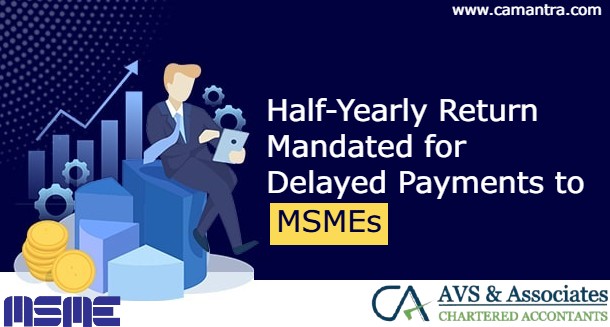Delayed payments have long plagued India’s Micro, Small, and Medium Enterprises (MSMEs), straining their cash flow and slowing growth. By April 2025, the total value of unresolved payment complaints filed on the MSME Samadhaan portal had surpassed INR 50,000 crore. In response, the government now mandates that companies file a half-yearly return disclosing payments overdue by more than 45 days to micro and small enterprises (MSEs).
This move complements broader efforts like Section 43B(h) of the Income Tax Act and initiatives through the Samadhaan portal, aiming to build a stronger financial environment for MSMEs.
Understanding MSME Form 1: What Is It?
Companies classified as “Specified Companies” under the Companies Act are required to submit MSME Form 1 to the Registrar of Companies (ROC) if they have outstanding payments to Micro and Small Enterprises (MSEs) that exceed 45 days from the date of delivery or deemed acceptance of goods or services. The 45-day limit is legally defined under the MSMED Act, 2006. “Deemed acceptance” means that if no written objection is raised within 15 days of delivery, the payment clock starts ticking.
This return helps track and discourage chronic delays, pushing for greater transparency and accountability.
Who Must Comply and What to Report
Any company purchasing from Udyam-registered MSEs is subject to this rule if payment delays exceed 45 days. MSME Form 1 must disclose:
- Total outstanding amount
- Names and PAN of MSE suppliers
- Due dates and reasons for delays
Filing deadlines are:
- 31st October (for April–September)
- 30th April (for October–March)
Non-compliance can attract financial penalties for both the company and responsible officers under the Companies Act, with further daily fines for continued default.
MSME Form 1 Compliance Checklist
1. Identify Applicability
- Confirm your company qualifies as a “Specified Company” under the Companies Act, 2013.
- Verify which vendors are Udyam-registered Micro and Small Enterprises (MSEs).
2. Track Payment Obligations
- Monitor invoice dates and calculate 45 days from delivery or deemed acceptance.
- Flag all payments overdue beyond 45 days.
3. Maintain Accurate Records
- Keep records of vendor name, PAN, due date, amount, and reasons for delay.
4. Prepare the Return
- Use the official MSME Form 1 format.
- Double-check all data entries for accuracy.
5. Meet Filing Deadlines
- File by 30th April (for Oct–Mar period).
- File by 31st October (for Apr–Sep period).
6. Ensure Internal Accountability
- Assign responsibility to a team or compliance officer.
- Use accounting software or ERP to trigger payment alerts.
7. Avoid Penalties
- Submit the form on time to avoid fines.
- Promptly address any filing errors.
Why It Matters: Financial and Tax Consequences
This compliance rule is supported by Section 43B(h) of the Income Tax Act, which came into effect on April 1, 2024. This section denies tax deductions on expenses if MSE payments are not made within 45 days, unless paid in the same financial year. Together, MSME Form 1 and Section 43B(h) bring visibility and financial consequence to payment delays, encouraging companies to honor their dues on time.
Take Action: Support a Fairer Business Environment
Complying with MSME Form 1 isn’t just about avoiding penalties—it’s about building a transparent and ethical supply chain. Large companies and MSMEs acting as buyers should prepare now by auditing vendor registrations, upgrading tracking systems, and assigning compliance responsibility. These steps will contribute to a healthier business ecosystem where timely payments to MSMEs become the norm.

